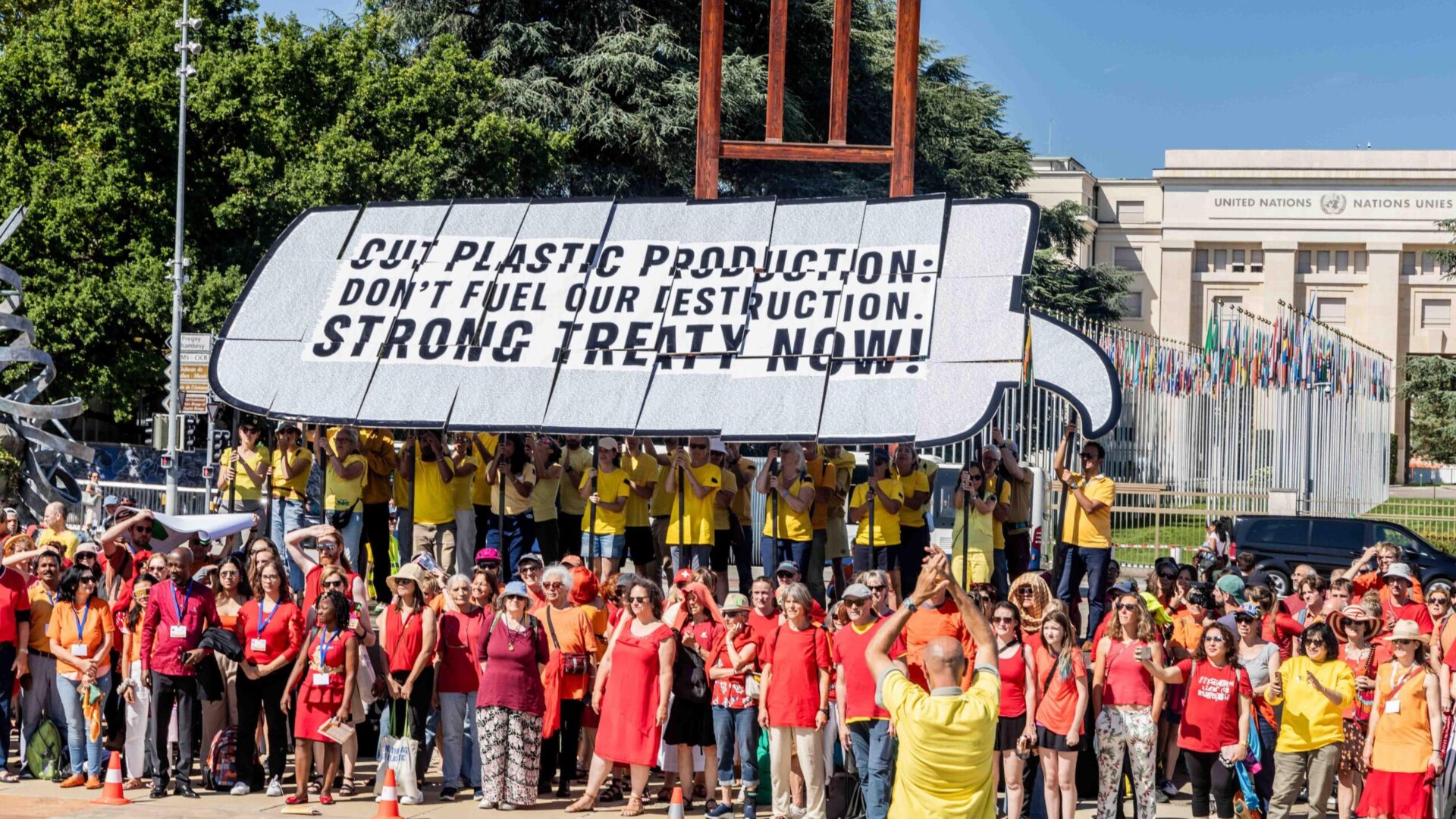
Global Plastics Treaty 2025 LIVE Updates
No agreement reached on Global Plastics Treaty in Geneva as negotiations collapse once again
Since 5th August 2025, world leaders, negotiators, campaigners, and corporate lobbyists have been gathering in Geneva for a critical moment in the fight against plastic pollution: the final round of negotiations for a Global Plastics Treaty. The last scheduled day of negotiations was yesterday, Thursday 14th August, but no agreement has been reached as talks collapsed. More details below.
Stay tuned here and on Instagram for live updates from Geneva as we find out why the Global Plastics Treaty failed once again, and what this means for the future of our planet.
–
Day 11, Friday 15th August
Once again, crucial negotiations have ended without a binding treaty to save our planet from plastic pollution. After two weeks of talks, this is a devastating failure by our global leaders, and the outcome is nothing short of an outrage.
It’s no secret that the world’s big-oil petrostates deliberately derailed the process, using every trick in the book to block progress towards a plastic-free future. Every year, over 400 million tonnes of plastic is churned out, choking our oceans, fuelling the climate crisis and poisoning our communities. This will only worsen if the world does not agree on a bold treaty to curb plastic production at its source- we cannot recycle our way out of this monumental mess that is threatening humanity.
The failure to produce a treaty underpins the systemic problem of profit being put ahead of our planet and we are sick of this narrative. Global leaders cannot allow those responsible for the crisis to write the rules. The UK must keep fighting for a strong treaty and stand boldly in the face of powerful polluters.

Image credit Break Free From Plastic
Day 10, Thursday 14th August
After emergency negotiation sessions last night and today, the final plenary (where an outcome will be announced) was scheduled for 3pm, then 6pm, then 9pm, then yes, you’re reading correctly – 11:30pm.
Talks are now on the bridge of collapse with just hours left before the deadline and negotiators deadlocked over the most contentious and important issues.
Environmentalists and Indigenous leaders held an emergency press conference today where they told attendees ‘a weak treaty will fail the world’.
At the heart of the disagreement is Article 6, which addresses the supply of primary plastic polymers whether the treaty should impose mandatory production cuts. High Ambition Countries say it’s essential to put a production cap on plastics to address pollution at its source, while petrochemical producers and their allies STILL argue the focus should remain on waste management and recycling.
Outside the Palais des Nations, Canadian artist Benjamin Von Wong’s six-metre-high sculpture The Thinker’s Burden has been gradually engulfed in plastic waste each day of the talks.
“From the air we breathe to the food we eat, microplastics and toxic chemicals are entering our bodies, and future generations will inherit the consequences if we fail to act now,” Mr Von Wong said.
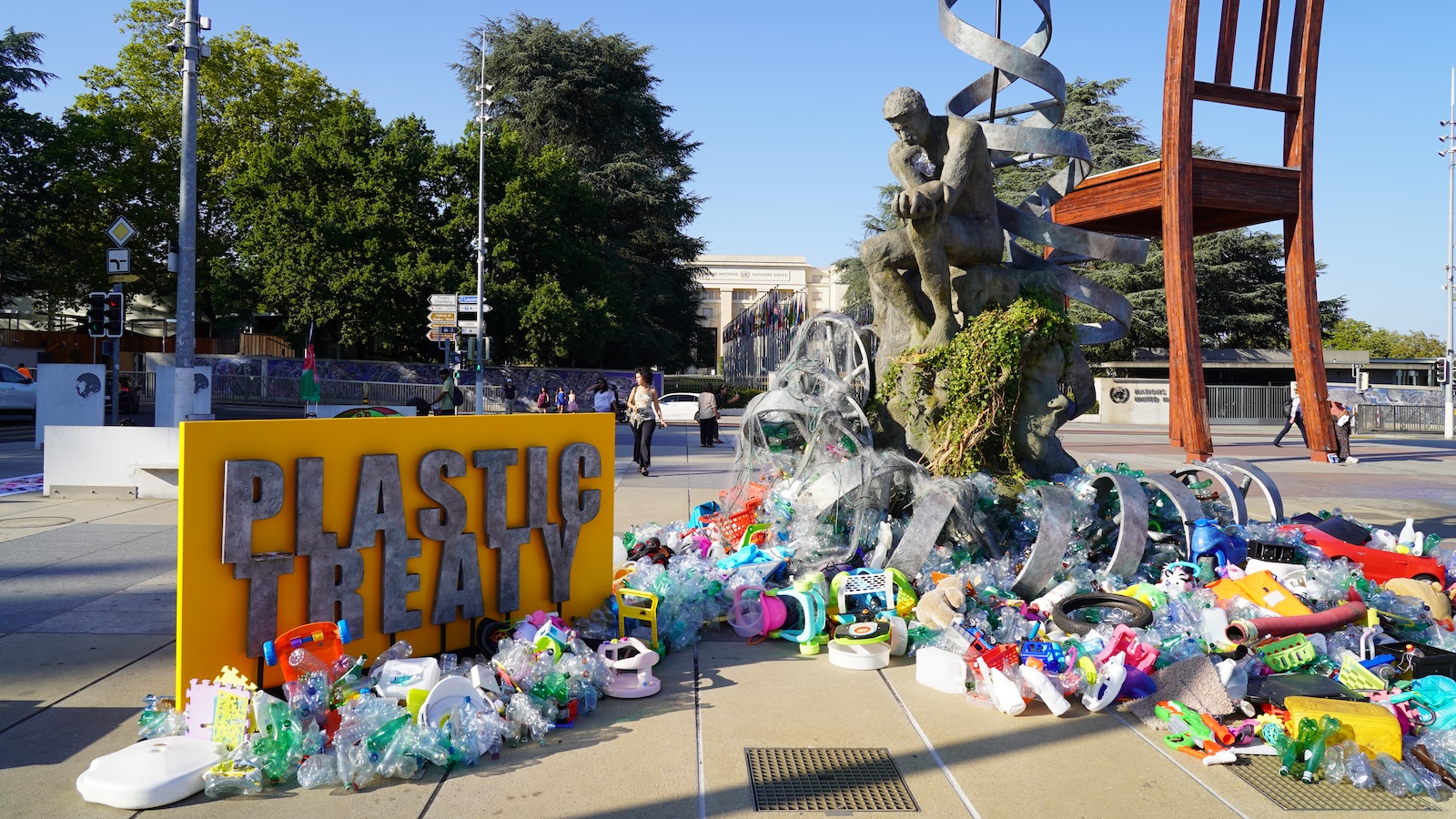
Right now, nobody knows what the result will be, but things are looking bad.
There are three potential outcomes:
- An unambitious treaty
- A more ambitious treaty (with added elements such as plastic production caps)
- No treaty
In these final hours, eNGOs are calling for people to email their countries’ Ministers
Only time will tell.
Day 9, Wednesday 13th August
The Chair’s Text Has Been Released – and It’s Worse Than We Thought.
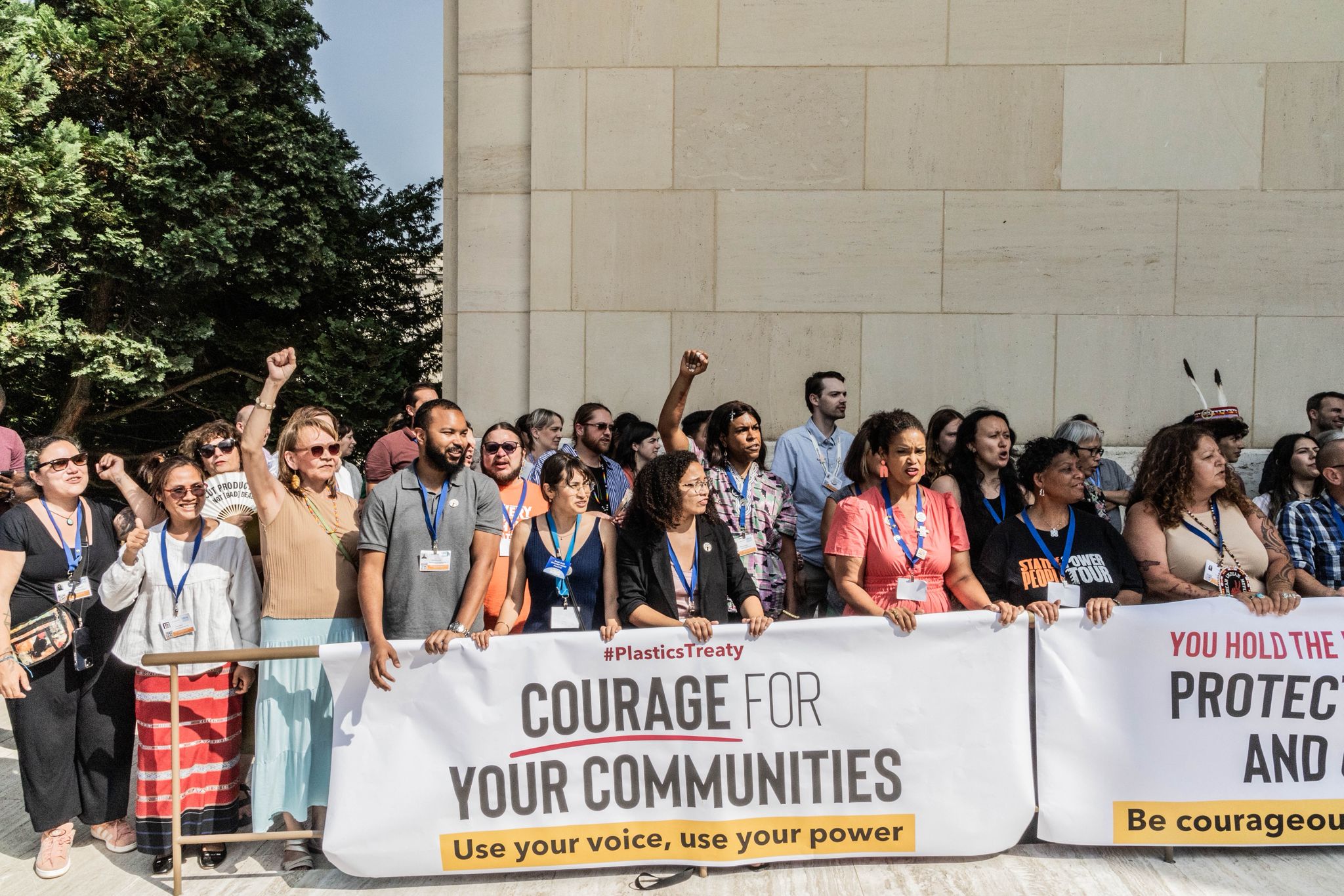
Image credit Break Free From Plastic
After 3 years of negotiations for a global plastics treaty, the draft Chair’s text for INC 5.2 has been published. High Ambition Coalition (HAC) countries and eNGOs, including SAS are outraged, and rightly so!
It does not fulfil the mandate of Resolution 5/14 to end plastic pollution, as it does not include or address:
- The full lifecycle of plastics
- Plastic production caps
- Bans on Chemicals of Concern
- Contain Implementation mechanisms and lets nations determine nationally-led approaches
- Reuse targets
- Waste trade
There is also no attempt made to reduce plastic dependency through mandating reuse and refill systems. This text is unjust, and represents only the will of petrostates and petrochemical producing countries. There will be serious implications on global economy, environment, climate and health if nothing is addressed.
Panama opened the floor with a damning and honest statement, “You must provide something new. Our redlines and the redlines of a majority of countries represented in this room were not only stomped but they were spat on and they were burned. We have only 30 hours to prove that we can lead and we can get to a Treaty. But our goal here is to end plastic pollution not simply get to a political arrangement… This is not about closing a treaty at any cost. It is about closing a wound that we’re leaving open in people’s lungs, in our rivers and our oceans. The text presented here makes that wound fatal and we will not accept it.”
The Charted Institute for Environmental Law (CIEL) responded to the text: David Azoulay, Head of CIEL Delegation said, “The new chair’s text makes a mockery of a three-year-long consultative process that showed broad support for an ambitious plastics treaty that addresses the full lifecycle of plastics, including production. While there are token references to UNDRIP, human rights, and human health, the provisions that follow undermine any and all measures that follow. This is a treaty that all but ensures that nothing will change. It gives in to petrostate and industry demands with weak, voluntary measures that guarantee we continue to produce plastic at increasing levels indefinitely, fail to safeguard human health, endanger the environment, and damn future generations. It will be very difficult to come back from this, and we encourage Member States to reject the text.”
What Now?
There are calls from HAC countries for a secondary draft text to be published, one that actually takes into consideration the views of these nations. There are also calls for the INC process to be fundamentally changed at this late stage, to enable a majority of countries who want something ambitious to be agreed, to get a deal across the line.
You can continue to watch the Plenary LIVE here INC-5.2 on plastic pollution (part 3) | UN Web TV
Further updates will be shared tomorrow morning.
Day 8, Tuesday 12th August

It’s Youth Day at the Treaty
Today several young people spoke at the Global Plastics Treaty on ‘Youth Day’ to demand ambition in the final stages of negotiations. Together they had a clear message – use this opportunity to end plastic pollution now, or future generations will pay the price of inaction, and will not look kindly.
We’re Relying on YOU, Ministers.
Day 6 and 7, Monday 11th August
Fix the process. Keep your promise. End plastic pollution
Here’s a round-up of what happened over the weekend and what we can expect from the week ahead as we enter the final days of negotiations.
The first week of talks in Geneva fell behind schedule and failed to produce a clear text, with countries deeply divided on a number of key issues and even the purpose and scope of the treaty itself.
Tensions are rising as progress remains painstakingly slow, and it looks like attempts to deliver a meaningful treaty are in danger of failing for a second time. To keep the pressure on, more than 200 observers from eNGOs and civil met delegates with signs as they arrived for negotiations on Saturday, sending them a clear message: “Fix the process. Keep your promise. End plastic pollution.”
Delegations themselves expressed concern about the slow pace of the negotiations, and during Saturday’s plenary, a number of countries stated that in order to move forward more effectively, some changes need to be made to the dynamics of the negotiations. A delegate from Fiji summarised the situation, stating, “to break free from plastic, we must break free from brackets. Go faster”.
The treaty is set to be settled by universal consensus, but with the lowest-ambition countries comfortable not budging, the outcome of this week looks uncertain.
Slow progress & sticking points
- Delay Tactics: We have continued to see delaying tactics by low-ambition countries who are wasting time by questioning basic definitions such as ‘plastic’, ‘microplastics’, ‘life cycle’, or ‘sources’. In addition, some are continuing to raise procedural questions even after requests were made to focus on substantive discussions in the text, and they continue to question the scope of the treaty as if it were not clear from the UNEA 5/14 resolution that it should address the full life cycle of plastics.
- Plastic Production: Article 6, which addresses plastic production, is still the main sticking point. No agreement has yet been made on this article, with some low-ambition countries trying to limit the treaty’s scope to exclude plastic production. Some are calling for the article to be removed entirely.
- The Impact on Human Health: During negotiations on health measures, some low-ambition countries sought to remove references to human health, arguing it falls outside the treaty’s mandate and calling for its entire removal. They resisted recognising plastic as a serious health threat, proposing instead to refer to it as a “potential impact” on human health, despite growing scientific evidence.
Some wins
- Multiple countries supported a mandatory obligation to develop and implement binding national action plans.
- There was a proposal to exclude chemical recycling from environmentally safe technologies for processing and recycling plastic.
We’ll continue to report on how this week unfolds on social media here.
Day 5, Friday 8th August
Time is Running Out
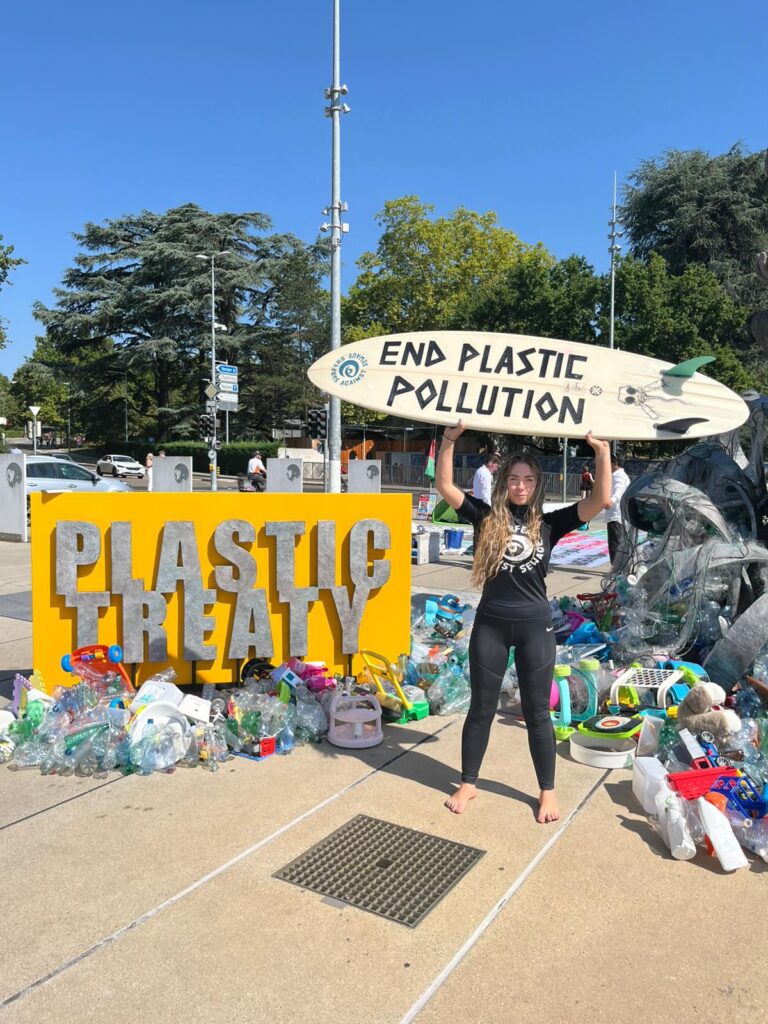
As we near the end of the first week, tension is rising in negotiations. With Ministers arriving next week, elements of text will soon be decided upon but there is still much devision between the High Ambition Coalition and the (low ambition) likeminded countries. To keep the pressure on delegates to remain ambitious, SAS protested outside the UN, demanding a treaty that cuts plastic at its source.
Along with us, we took a community-made banner full of quotes, to highlight the voices relying on decision makers.
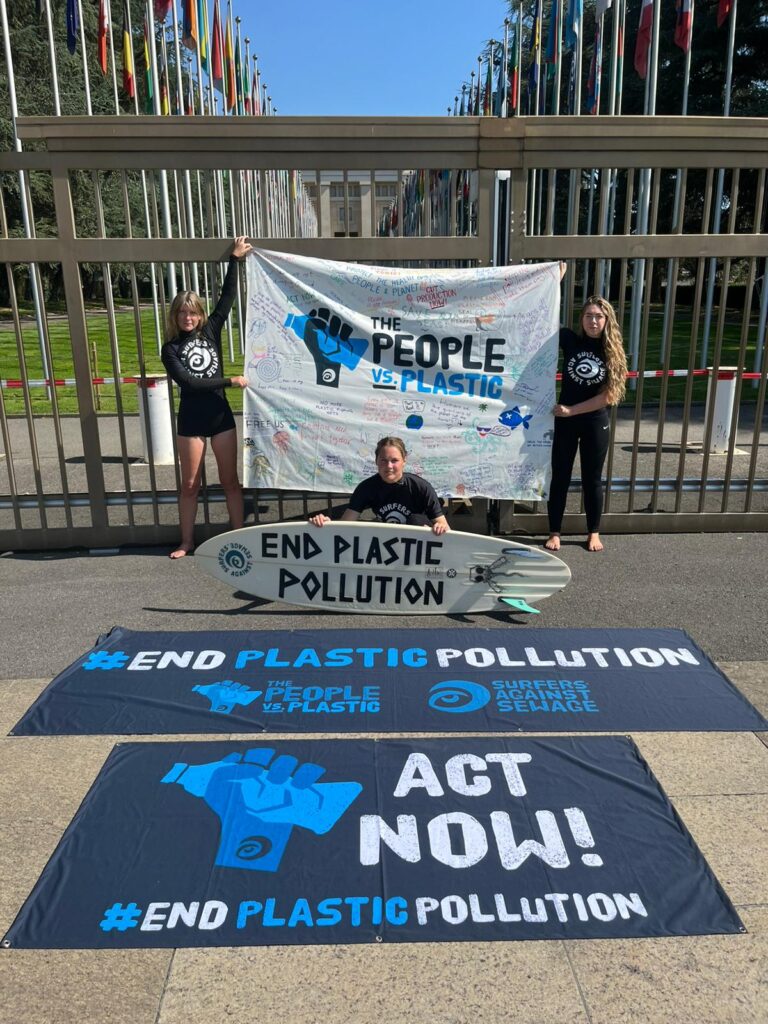
Day 4, Thursday 7th August
Negotiation Insights So Far:
The Good…
1. During discussions on plastic products, ambitious voices supported regulating toxic chemicals using best available science, transparency measures, and global lists of chemicals and targets. A delegation later urged those opposing global regulations to step aside and not block the countries willing to deal with this global problem.
2. A proposal led by Colombia and Perú, ensuring that future Conferences of the Parties (COP) can adopt decisions through voting if consensus cannot be reached, has gained support from 118 countries.
3. A proposal prepared by Canada highlights the disproportionate burden Indigenous Peoples face from plastic pollution and criticizes the treaty text for not appropriately reflecting their rights, knowledge, and participation. 45 delegations support the proposal. It’s been positive to see the delegation support this proposal inside negotiation rooms.
4. A Switzerland/Mexico proposal supporting global control measures for plastic products and chemicals in products has the support of at least 130 countries. No other proposal has gained such significant support.
5. When discussing financial mechanisms, a mix of countries called for equity measures financed by developed country parties to support developing countries in implementation efforts.
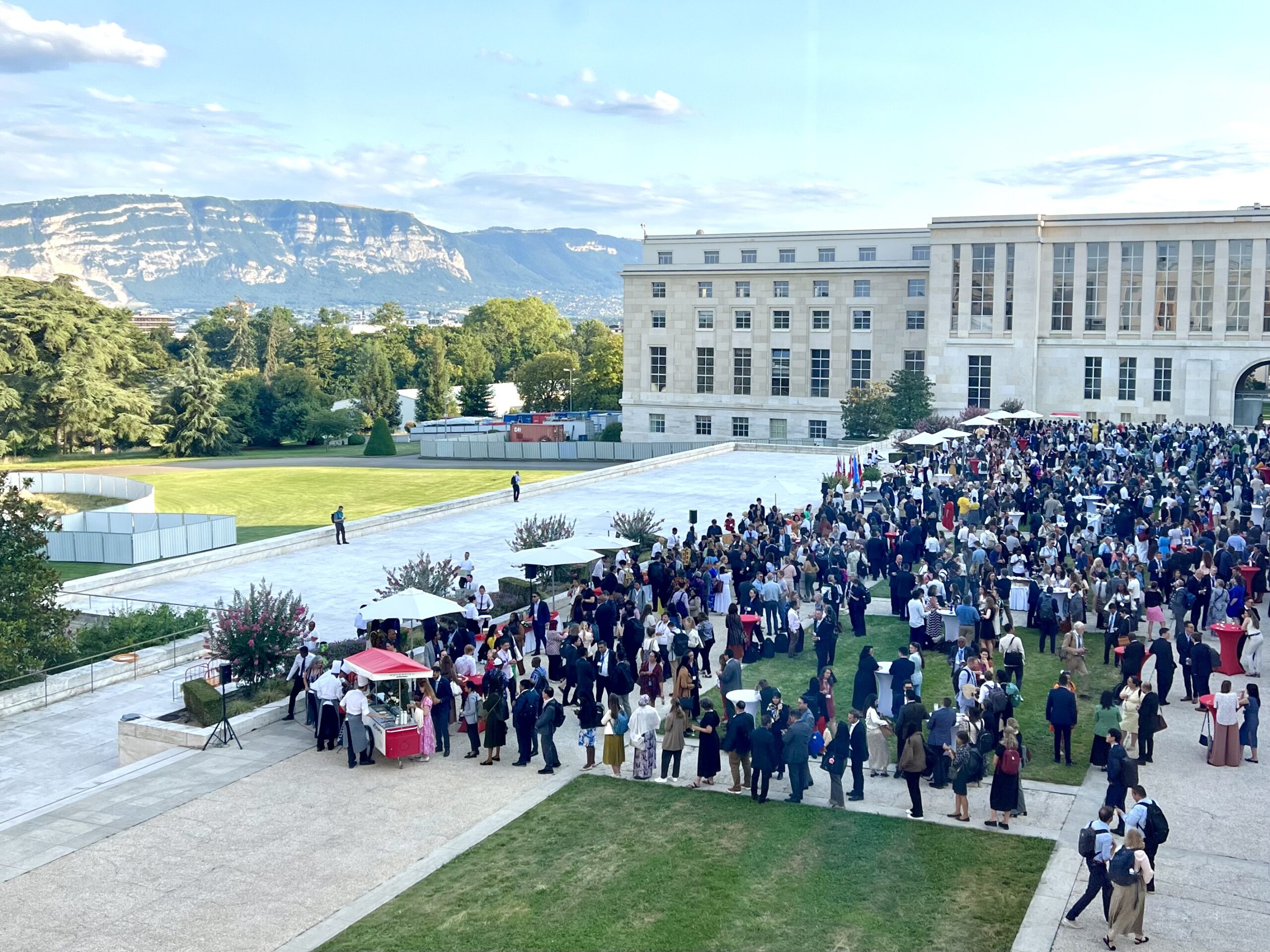
The Bad…
1. In the opening plenary, Saudi Arabia and Iran jumped straight in to push back on production reduction measures.
2. In a déjà vu to other INCs, some low-ambition countries wanted to narrow the scope of the treaty and continued to ignore that the 2022 UNEA 5/14 resolution mandates a treaty that addresses the full lifecycle of plastics.
3. Some countries wanted to remove mentions of health and climate, ignoring that, without science-based definitions, the treaty will be unable to effectively protect human health and the environment.
4. Low ambition was felt in other discussions as well; specifically when talking about leakages. Some countries tried to water down the text—either by denying that plastic production causes leakages of harmful chemicals, or even by suggesting deleting the article entirely.
5. Saudi Arabia (on behalf of the Arab Group) submitted a proposal outlining their position on the Conference of the Parties (COPs) that will follow the agreement on a Global Plastics Treaty. In the submission, it’s proposed that all decisions at COPs are made by consensus, which could significantly slow processes, protect the interests of obstructionists, and lead to weakened outcomes. Later in the evening, during the contact group negotiations, one delegation went as far as to suggest that participation of observers (such as SAS) in the implementation process should also be decided by consensus, which would allow any country to exclude observers from the process.
6. Malaysia, Kazakhstan, and Saudi Arabia, on behalf of the Arab Group, reaffirmed their low-ambition position on Article 6, which aims to regulate plastic production, by submitting formal proposals for the article to be struck in its entirety.
7. Regarding financial mechanisms for treaty implementation, countries still cannot agree on the best way to ensure that the polluters are also paying for the impacts of plastic pollution. Several countries (some high-ambition) sided with low-ambition countries, stating they would not support any historical responsibility… There is also a lack of attention on the issue of large subsidies given to the fossil fuels, petrochemical, and plastic industries, which are fuelling the plastic crisis.
The UGLY…
As negotiations continued on Wednesday, low-ambition countries once again attempted to drag the treaty backward—outrageously arguing that this treaty isn’t about plastics, but rather only about plastic waste management. As one high-ambition country put it: “If this agreement is not about plastic, what is it about then?”
Big Oil is Making a Mess
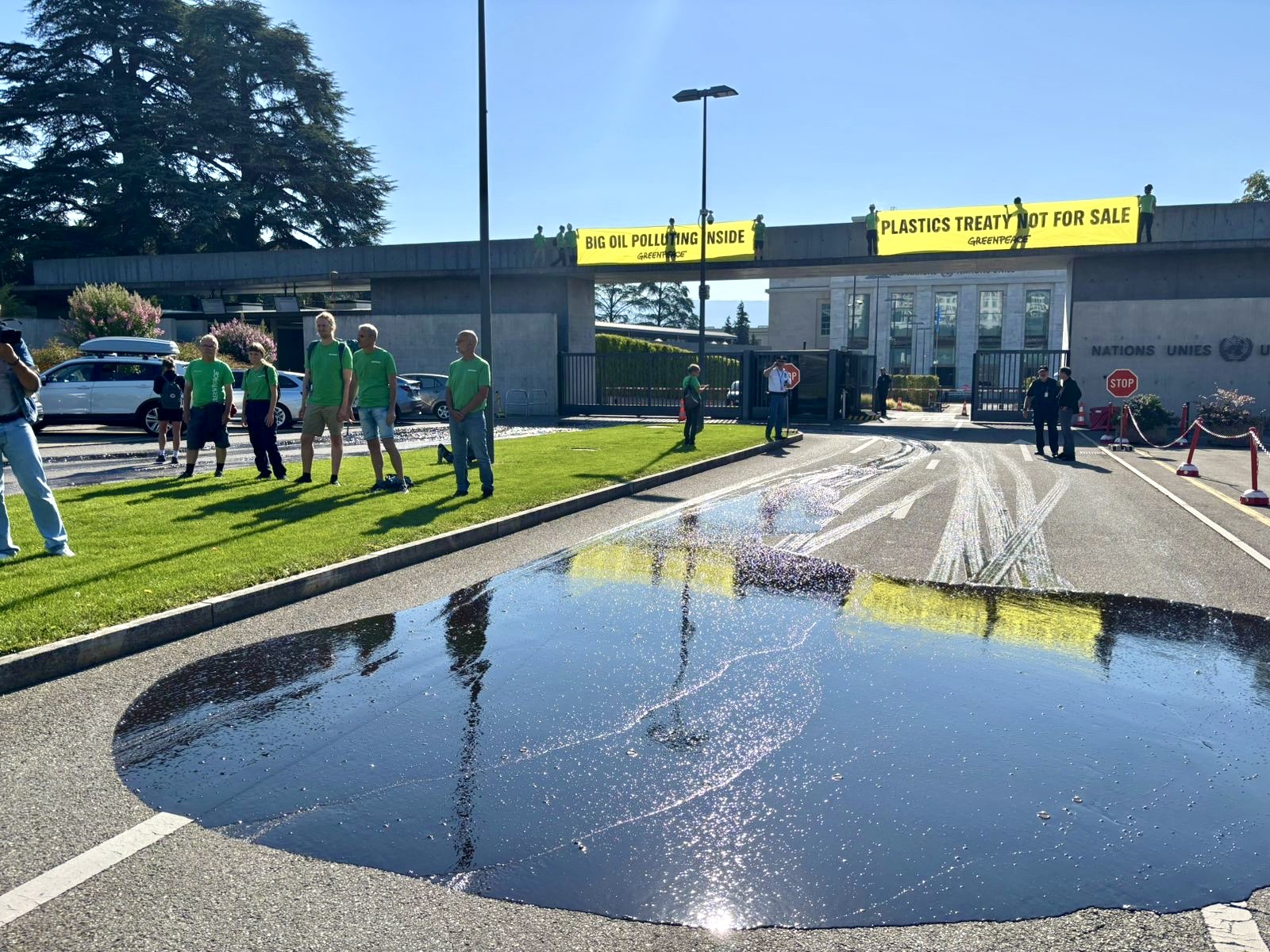
Further analysis released today by Break Free From Plastic and Centre of International Environmental Law found that Fossil Fuel and Chemical Industry lobbyists have flooded the negotiations in record breaking numbers, outweighing the scientist coalition four-to-one, and have worryingly secured places on at least 19 national delegations.
A dirty trail of oil and plastic pollution is clearly making a mess in Global Plastic Treaty negotiations, as demonstrated by a powerful Greenpeace stunt this morning as pictured above.
Making Your Community Voices heard at Global Negotiations
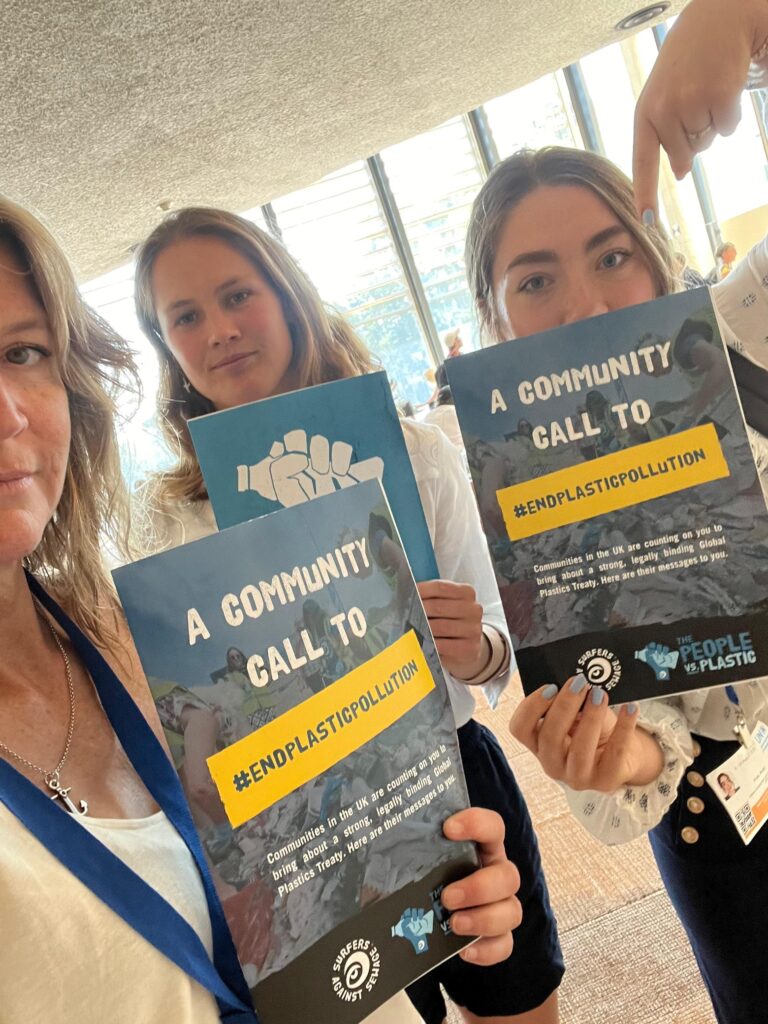
In light of recent news, we’ve been more determined than ever to make sure your community voices are heard loud and clear by powerful decision makers, to drown out the plastic lobby.
We spent every opportunity between contact group discussions targeting delegates from across the world, including low-ambition countries, like China and America. When speaking to these countries, we upheld your voices, sharing the Community Call To Action to End Plastic Pollution. The reception we received varied from genuine interest and gratitude towards our work, though to outright laughing at our demands to cut production… 🤬 But we won’t be stopping here. We’ll be keeping the pressure on and won’t back down.
Day 3, Wednesday 6th August
It’s day 3 in Geneva and things are getting interesting. Yesterday afternoon the provisional attendee list was released by the UN. Since then, Surfers Against Sewage have been analysing the list to track down the polluting lobby present with a specific focusing on brands we have found polluting our rivers, beaches, mountains and streets in the UK.
We’re calling them out, one by one — and making sure the voices of communities, not corporations, are heard in these rooms.
Read the full story & brand expose
Day 2, Tuesday 5th August
The Opening Plenary
The Global Plastics Treaty 5.2 Negotiations began with an opening plenary, where delegates from every country, and thousands of observers, including SAS, sat to begin discussions.
Some powerful statements were made by the opening committee. First we heard from the INC Chair, Luis Vayas Val-divieso who said;
“We need to complete a historic task by August 14th. I believe you can find the solutions to find resolutions to the final remaining issues. I want you to envisage that is it August 14th, we have agreed a global treaty, and history is made – it is up to you to get us there. History is not built on comfort but on courage.”
Executive Director of UNEP, Inga Anderson, then stated an important opening address;
“As you get round to negotiating, I want to remind you that the world is watching, wanting you to succeed in tackling the plastic pollution crisis. People are outraged – rightly so. Plastic pollution is infiltrating our oceans, in our bloodstreams and effecting ecosystems. If we don’t tackle this now, we will face even more significant consequences for the environment and human health. It is in your hands to get this treaty done. It is in your hands to protect our environment and human health.”
SAS then listened to statements from a variety of observers, including a powerful piece from Break Free From Plastic, who said;
“Let’s be clear, these negotiations are being held captive by fossil fuel and plastic polluting industries. A treaty that does not cut plastic production, eliminate toxic waste and chemicals is a treaty destined to fail.”
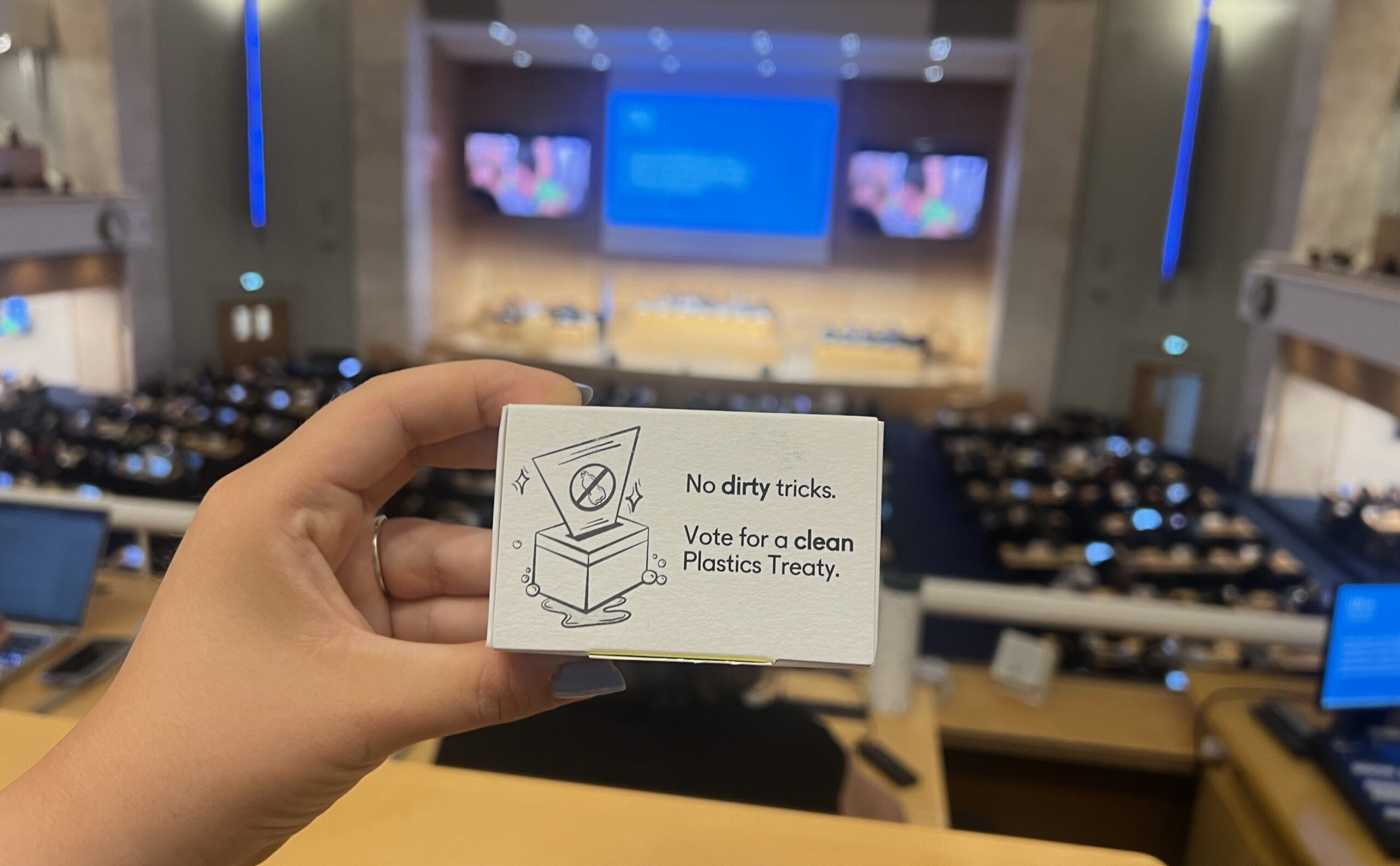
The No Dirty Tricks! Stunt
Today we are taking part in an eNGO-wide stunt to hand out bars of soap which have ‘No Dirty Tricks’ written on them. These will be handed to specific country delegates and the plastic polluting lobby.
Our SAS team (who are observing) were randomly seated beside the Coca Cola delegation… SO, we began the stunt series by handing out a bar of soap to their employees, and demanded “No Dirty Tricks”. We asked them to consider our 7 key actions (as outlined in our Global Plastics Treaty explainer blog). Stay tuned on Instagram for a video of this action.
We managed to track down the Official UK Delegation for the second soapy offering to demand No Dirty Tricks! The delegates were happy to chat with us about what SAS wanted to see agreed at the plastics treaty. They then received a copy of our community call to action, and responded saying ‘they appreciated input from us and our communities.’
The first negotiation meetings and evening reception…
Delegations met for the first time this negotiations to discuss text ‘where open issues remained’, such as Article 2, on ‘scope and definitions’ which we heard about today. Due to the rules and procedures surrounding official UN negotiation meetings, SAS are not authorised or allowed to share details on what exactly was discussed, but let’s just say…ambitious countries, are experiencing a déjà vu, as regressive, petrostates forget that the 2022 UNEA 5/14 resolution mandates a treaty that addresses the FULL lifecycle of plastics (from plastic production to waste management). We have a long way to go in 10 days!
After a heated but insightful first day of talks, all attendees were invited to an official evening reception, where SAS managed to meet with Secretariat Jyoti Mathur-Philipp to hand her our community call to action. She commended SAS communities for their efforts on the ground ‘while the world waits for decision makers to catch up.’
Stay tuned tomorrow for more!
Day 1, Monday 4th August
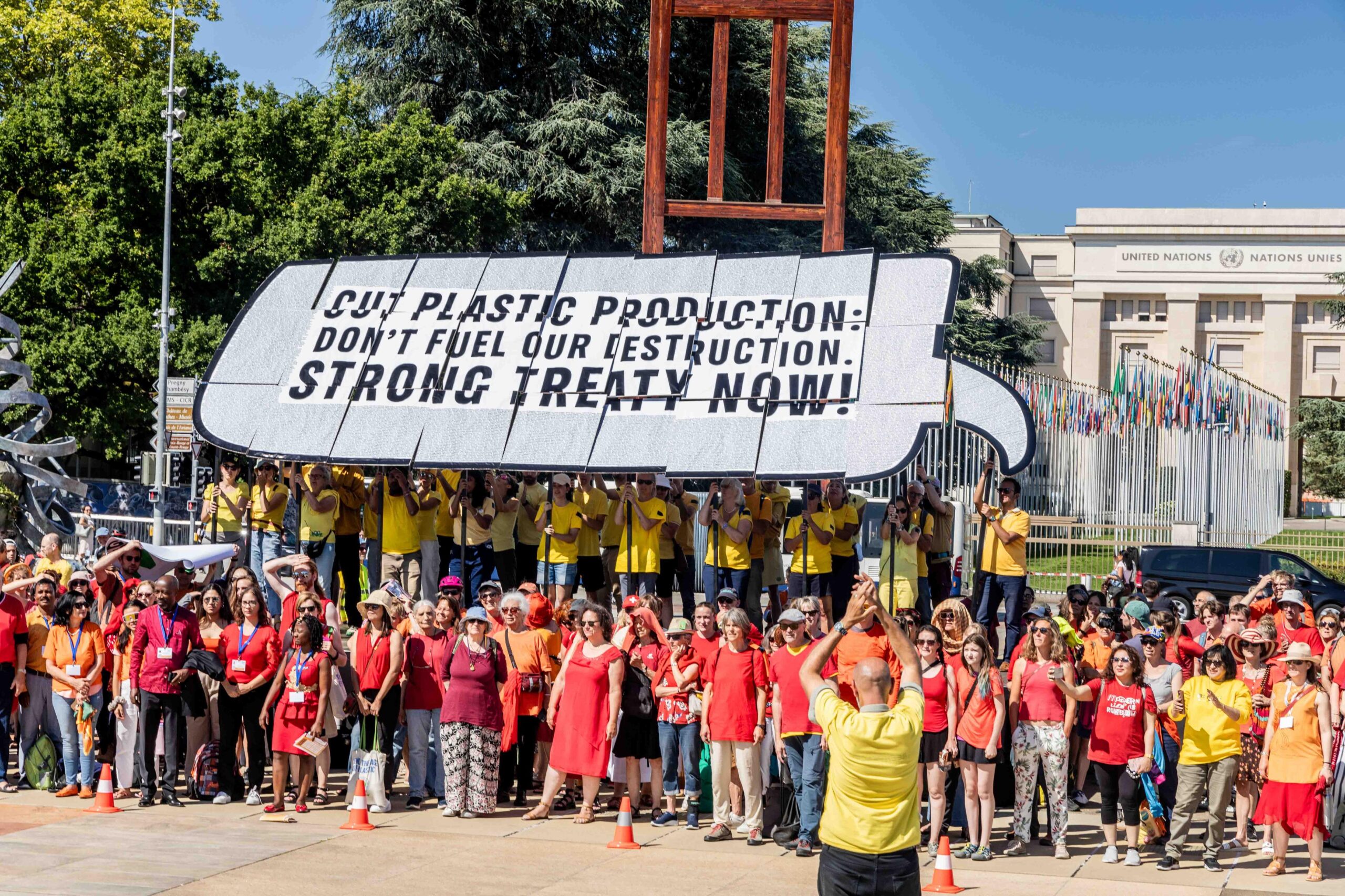
It’s day one of the Global Plastics Treaty in Geneva! And the Surfers Against Sewage team are here on the ground.
Alongside hundreds of environmental and civil society groups from around the world, we’ll be standing up to polluters and calling on negotiators to deliver the bold action people and planet urgently need. We’re bringing the voices of our 630 Plastic Free Communities, 200+ Regional Reps, and thousands of volunteers right to the negotiation table—through a manifesto of demands, powerful community stories, and creative actions that can’t be ignored.
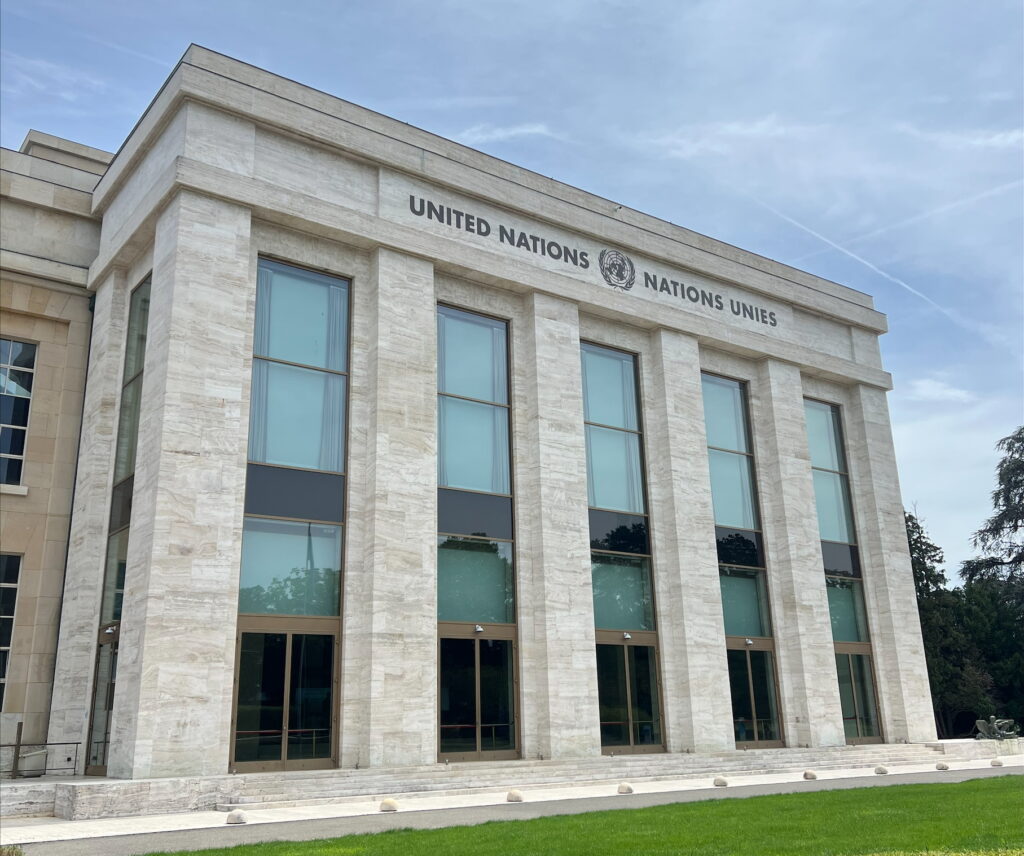
We’re off to a swimming start! Here’s what’s happened so far:
eNGO Meet Up
SAS attended a meeting with environmental organisations from around the world to discuss what we wanted to see from this (hopefully final) Global Plastics Treaty.
The top priorities were:
- Unity not uniformity: Ensuring that the environmental community work together to bring about the change we want to see.
- Defend the mandate: To defend the ambition of UNEA GPT and the rights of those most harmed by plastic pollution – not just react to diluted compromises.
- Process matters: We must bring our voices to the spaces that matter. And call for a robust treaty with a transparent process as this will shape what is possible.
- People over procedure: This treaty must protect lives, not just legal language.
Dissections of which pieces of treaty text were had, but one of the most prominent and powerful discussions surrounded staying hopeful.
As Jurrisa, an indigenous human rights campaigner from New Zealand states:
‘We cannot lose hope, we hold the hope for our communities – if we lose it, the oil and plastics lobby win’.
Conversation with observers
Next, we set off to a discussion at the UN that gave communities a chance to ask questions about the process and state what they wanted to see from negotiations. It provided great insight into how the final round of talks could pan out.
Mass mobilisation
Team SAS are attending a mass mobilisation with other environmental campaigners to demand a strong plastics treaty, stay tuned on Instagram for live video coverage.
